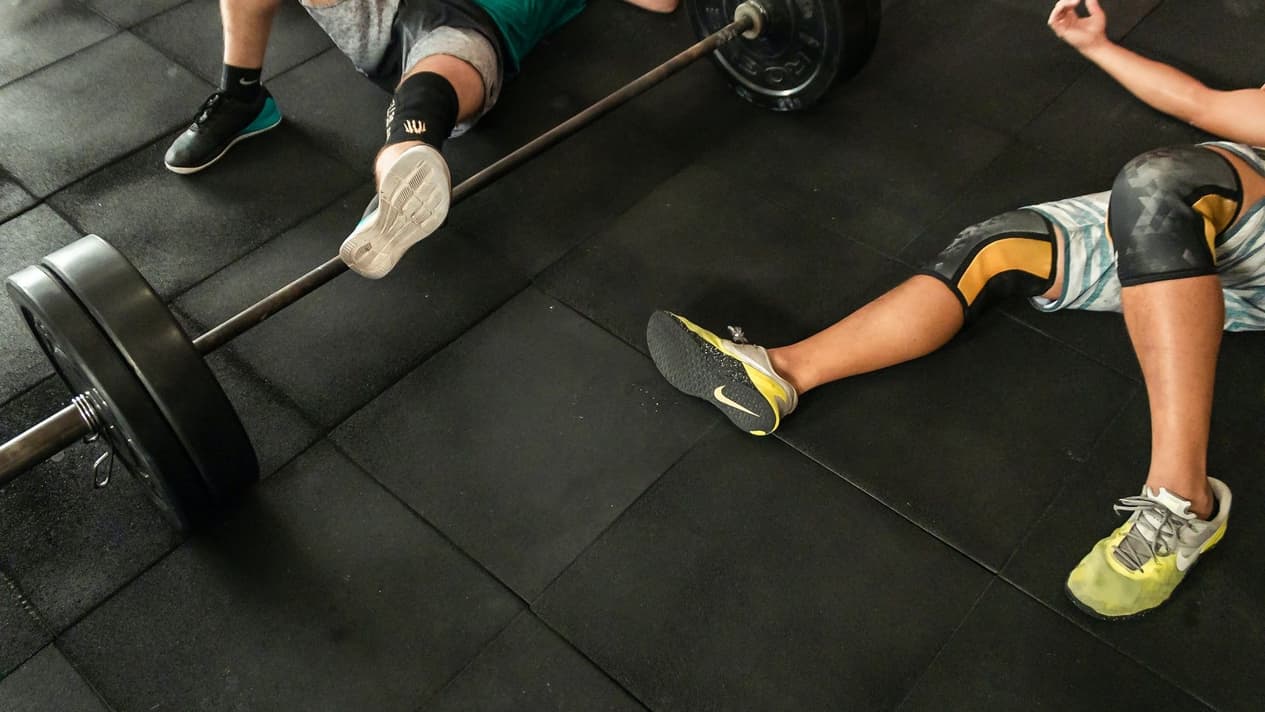It can be too easy to over-exercise or overtrain without even realising!
There are several reasons why we do this. We can get so caught up with
reaching a fitness goal, addicted to seeing results and wanting more, or
training for an upcoming competition that we ignore the signs and signals
from our body to slow down.
There are several reasons for excessive training or exercise. For athletes,
the pressure to perform, the pressure (and drive) to win, and the pressure
from sponsors can push them to overtrain.
For everyday fitness fanatics, we may over-exercise for personal reasons.
Sometimes we try our best to do 6 months’ worth of weight loss in two weeks
for a special event. Maybe it’s a wedding, a holiday to Dubai, or perhaps
you’re planning on ‘accidentally’ bumping into your ex and planning on
flaunting your revenge body. For whatever reason, sometimes we can overdo
our training and exercise excessively. But how do we know if we’re
overtraining? And what does overtraining look like?
Am I Overreaching or Overtraining?
We need to distinguish the difference between overreaching and
overtraining. There comes a time with our training when we expose ourselves
to a much higher training load- one that we typically can’t sustain over
time. We’ll purposely increase the volume and intensity of our training
load in order to stimulate changes in the body, in order to increase
performance. I.e., We start lifting heavier weights to increase our muscle
mass, which hopefully results in increased strength and performance.
Overreaching is when we reachtoomuchwith our training.
Overreaching is considered an accumulation of training load that leads to a
decline in performance requiring days to weeks for recovery (1,2,3,4). Functional
overreaching (i.e., overreaching donecorrectly) is a necessary
part of development and progress (5). It is when we
push ourselves, or overreach, to the point where our performance eventually
declines. However, with adequate rest and recovery, you’ll ultimately adapt
and improve to levels better than before in a process known assupercompensation (6,7).
Functional overreaching is what we desire when looking at training,
recovery and improved performance, but we have to be careful not to cross
the line into overtraining.
It’s not hard to become addicted to exercising and training with the
effects of endorphins, dopamine, and other exercise-generated factors on
the brain. This addiction can easily result in repeated intense training
sessions that don’t include enough recovery periods. This places
individuals at increased risk for developing a non-functional overreaching
state and, in more severe cases, overtraining syndrome (8).
What is Overtraining?
Overtraining is when training exceeds one’s ability to recover and adapt (9). Overtraining (also known as Chronic Overtraining Syndrome) occurs when
we ignore the signs of overreaching and continue repetitive intensive
trainingwithoutadequate recovery. It involves the accumulation
of stress, mental and physical, leading to a decrease in physical and
mental performance in sports and exercise and can take up to several months
to recover (10,11,12,13).
Sometimes our mental toughness can mistake weakness or poor performance as
a signal to push through and train even harder, but this only breaks the
body down even further. And though it’s admirable to train hard to succeed
with your training or exercise goals, too much training without sufficient
recovery can hinder your progress — and even lead to a decline in your
performance.
For some, it may be hard to know when you’re overtraining. You’re expected
to feel somewhat fatigued after a challenging training session, but feeling
like you aren’t recovering between sessions or experiencing overall and
prolonged fatigue and difficulty pushing yourself during workouts can be
signs of overtraining.
Signs and Symptoms of Overtraining
Here are some common signs and symptoms of overtraining (14,15,16,17).
Training-related Signs of Overtraining
Lifestyle-related Signs of Overtraining
Health-related Signs of Overtraining
How to Recover from Overtraining
Full recovery from overtraining is difficult and can require weeks or
months off from working out (18).
If you suspect you’re overtraining, a short break and regression of the
training plan should be implemented. Trying to power through overtraining
can make matters much worse and could require a longer break from exercise
(19,20).
Recovery from overtraining includes:
Rest, Rest… and then Rest Some More
Rest is crucial for recovery from overtraining. You may need to temporarily
stop or cut back on your training.
Good Nutrition
Excessive training and exercise combined with a poor diet is a recipe for
burnout and chronic overtraining syndrome. Make sure your nutrition is on
point with an emphasis on ensuring that your body is receiving all the
calories, macros and minerals it needs for high-intensity training. Work
with a nutritionist to evaluate your food habits and make sure you’re
getting enough of what you need. Prep Kitchen provides a great selection ofnutritious mealssuited for
the active gym-goer or athlete.
Mental Health Care
Keep your stress down by implementing things like meditation, and try to
find enjoyment with activitiesoutsideof the gym
For an athlete who spends most of their time training or a fitness fanatic
who enjoys working out, it can be very emotional and challenging to take
time off from training.
Mental health professionals can help with recovery from overtraining by
offering a safe space to discuss your feelings and concerns. Getting
support and validation can help normalise the experience and help you feel
less overwhelmed or discouraged to take breaks. Mental health professionals
can also provide skills and techniques to help with psychological healing
during the breaks, such as mindfulness and visualisation.
Slow Return to Training
Your trainer, coach or health care provider should guide you back into
training when they feel it is fit for you to do so.
It’s important to not jump back into full training too quickly as this
could lead to a prolonged recovery. Your training volume may be reduced by
at least 50 to 60 per cent, and depending on how you feel, increase by
about 10 per cent each week.
The recovery will be different for every athlete, so It’s important to be
aware of symptoms with progression.
Visit your Health Care Provider
Consider talking to a doctor or health care provider if you have signs and
symptoms of overtraining. They can provide you with specific information on
your recovery and/or refer you to a medical specialist.
How To Prevent Overtraining
The best fix for overtraining is to avoid doing it in the first place. Here
are some points for preventing overtraining (22,23):
Reduce Training Load
In terms of exercise and training, have a de-load week- maybe once every
six weeks- where you reduce the volume of the training load for that week.
This gives the body time to heal and repair itself.
Listen to Your body
The niggles you feel in your muscles or joints; the limbs feeling ‘heavy’;
disrupted and bad sleep; these are all ways your body is communicating with
you. Listen to your body and work closely with your trainer, doctor or
coach and let them know how you’re feeling.
Schedule Rest days and Rest Periods
Effective training requires a balance between intense training sessions and
periods of rest and recovery (24). Too much overload and/or not enough recovery can result in both
physiological and psychological symptoms that limit performance and may
cause a lack of motivation and enjoyment with your training or exercising.
Schedule regular rest days after long or demanding workouts.
During training or a workout, have rest periods. Rest intervals can be
anywhere from 30 seconds to 6 minutes, and, if needed, reduce the volume
and intensity of your sessions.
Schedule Active Rest Days
Incorporate active rest days with low impact activities such as walking or
swimming. Low impact activities can help relieve muscle tightness and help
you stay active while recovering from a strenuous workout.
Acknowledge when you’re overdoing it — and talk to someone about it
If you find yourself becoming obsessed with training, exercising through
injury or pain, or feeling guilty if you go a day without intense exercise,
then talk to someone about your feelings. It’s important to have a healthy
relationship with exercise.
Monitor Feelings with Training
We’re mostly good at noting how our training is going, whether we hit a new
PR (personal record) or PB (personal best), but we don’t tend to note down
our feelings associated with our training or exercise. By monitoring our
feelings with exercising and training load we can recognize the signs of
overtraining and reduce the load to prevent overtraining.
Balance Training with Recovery Time
Rest is not a sign of weakness! We need at least one day of rest every
week. As the saying goes, train hard but rest harder!
Eat Right!
Ensure your calorie and/or macro intake is sufficient for your training,
repair and recovery needs. Eat a well-balanced diet with plenty of carbs,
protein, healthy fats, and fresh fruits and vegetables. Check out ourmeals at Prep Kitchenfor
our range of delicious healthy meals!
Manage Stress
When your stress levels exceed your ability to cope, your body will begin
to break down. Find ways of de-stressing such a meditation, or treating
yourself to a massage.
Sleep
Sleep is your bodies best time for recovery and repair.
To Sum Up
When you're an athlete or fitness fanatic, and love what you do and are
truly dedicated to working out, it becomes easy to ignore the signs of
overtraining until they get too loud.
Overreaching is what we desire with our training because although it
results in a temporary decline in performance, with appropriate periods of
recovery a positivesupercompensationeffect occurs, with the
athlete exhibiting enhanced performance. When our training exceeds our
ability to recover and adapt and we continue repetitive intensive trainingwithoutadequate recovery, we fall ill to overtraining.
Put simply, overtraining is good. Overtraining is bad.
Healthy sleep, nutrition and mental wellness are critical in preventing
overtraining. These must be part of the training programme just as much as
the exercise and rest plan.
Bottom line, if you want to get better and improve performance, you need to
schedule adequate rest in your sessions, and then rest some more.
Author - Paulo Vaa




